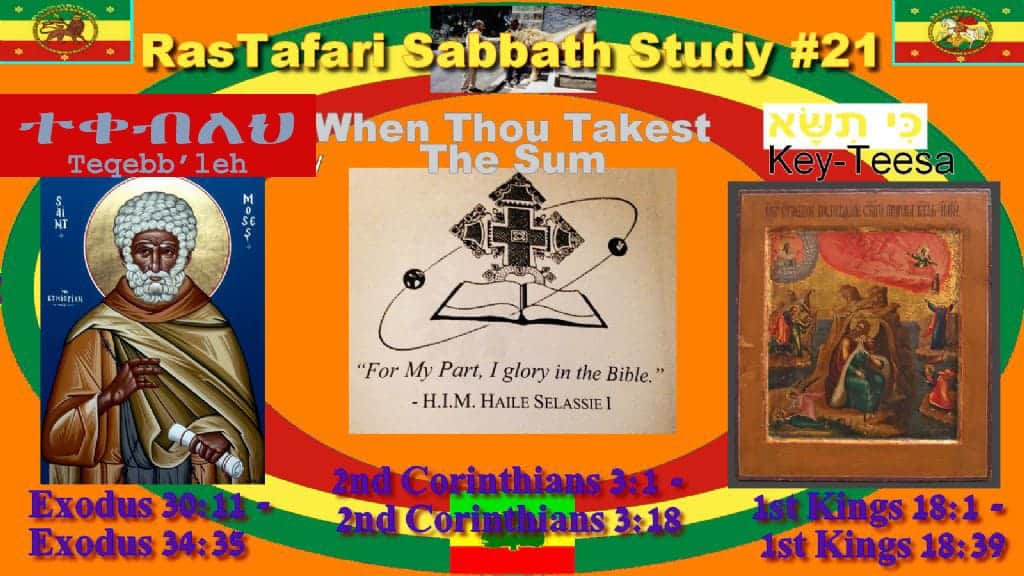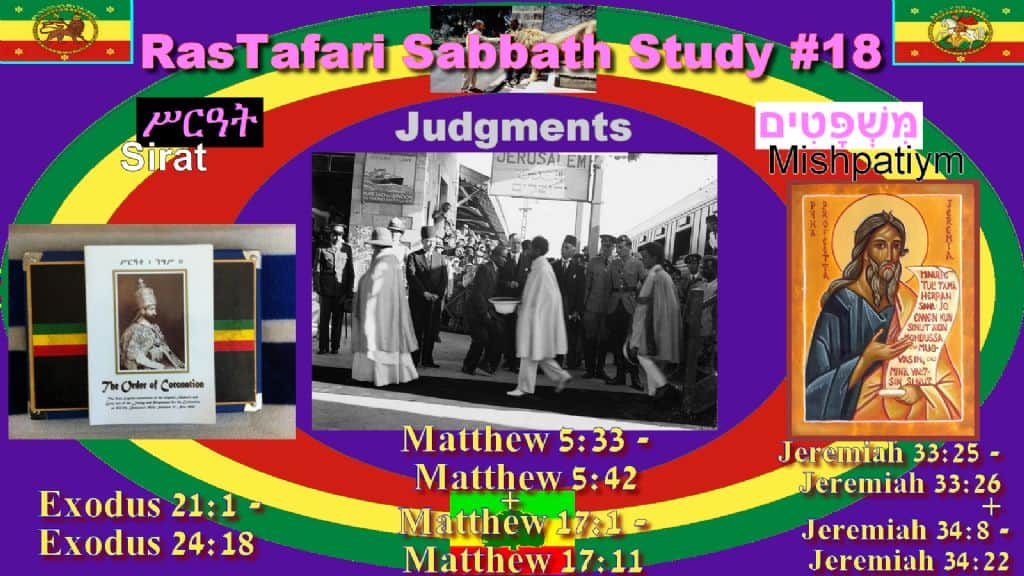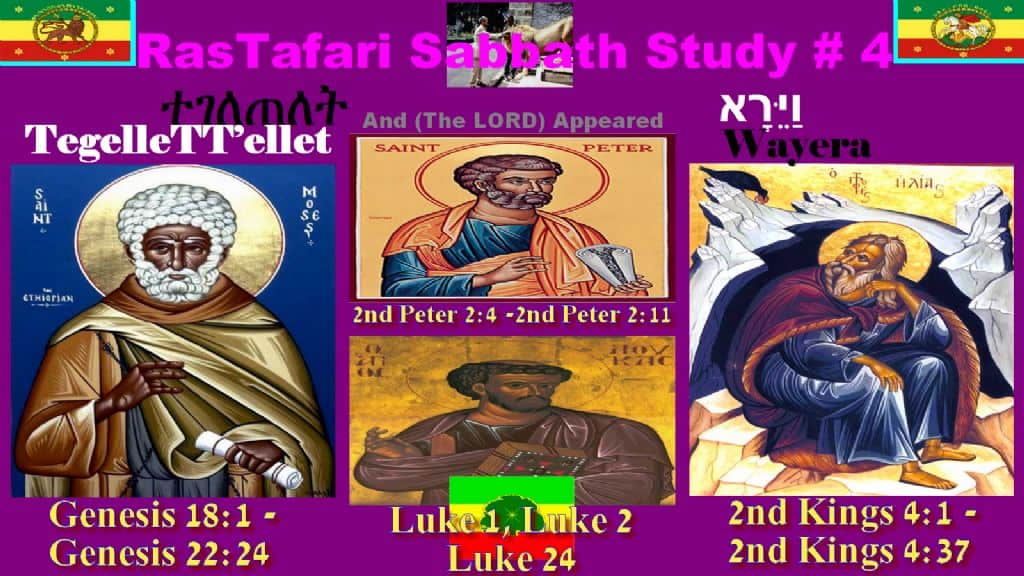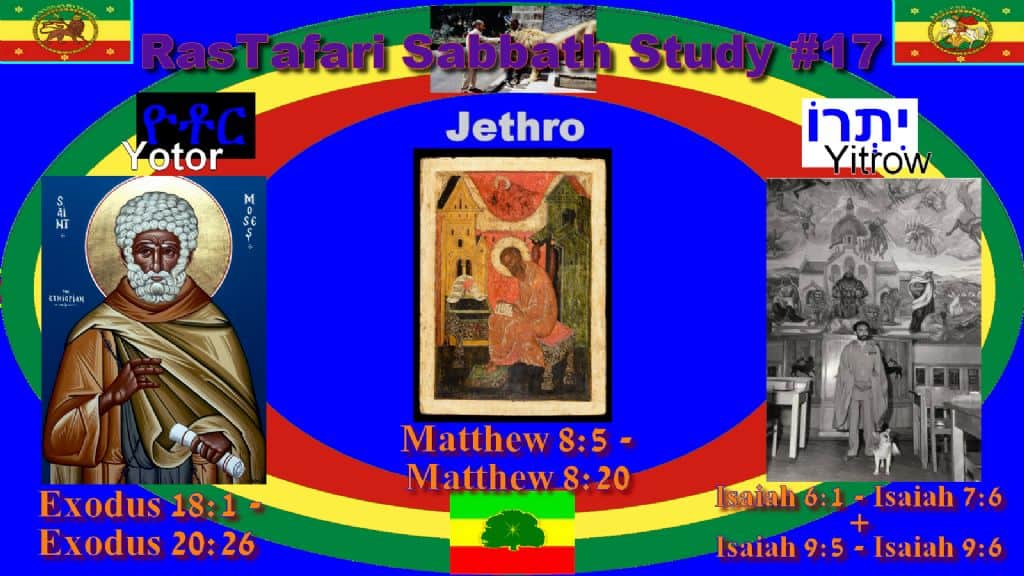This Week's Portion #21
Ki Tisa | כי תשא | "When you take" በቈጠርሃቸው ጊዜ | beQweTT’erhachew g’zey [gize]
*For a PDF version of All the Torah Portions Schedule, click here to download!
2. Prophets Reading
1 Kings 18:1-39
3. New Testament Reading
2 Cor 3:1-18
Portion Outline - TORAH
- Exodus 30:11 | The Half Shekel for the Sanctuary
- Exodus 30:17 | The Bronze Basin
- Exodus 30:22 | The Anointing Oil and Incense
- Exodus 31:1 | Bezalel and Oholiab
- Exodus 31:12 | The Sabbath Law
- Exodus 31:18 | The Two Tablets of the Covenant
- Exodus 32:1 | The Golden Calf
- Exodus 33:1 | The Command to Leave Sinai
- Exodus 33:7 | The Tent outside the Camp
- Exodus 33:12 | Moses' Intercession
- Exodus 34:1 | Moses Makes New Tablets
- Exodus 34:10 | The Covenant Renewed
- Exodus 34:29 | The Shining Face of Moses
Portion Outline - PROPHETS
- 1 Kings 18:1 | Elijah's Message to Ahab
- 1 Kings 18:20 | Elijah's Triumph over the Priests of Baal
Portion Study Book Download & Summary
SHEMOT Hebrew Book of Exodus - Torah Portion Vol.2 (FREE PDF)
Ki Tisa (כי תשא), the twenty-first reading from the Torah, literally means “when you lift up.” It comes from the first words of the second verse of the reading, which could be literally rendered, “When you lift up the head of the sons of Israel to reckon them” (Exodus 30:12). The phrase “lift up the head” is an idiom for taking a head count. The portion begins with instructions for taking a census, finishes up the instructions for making the Tabernacle, reiterates the commandment of Shabbat and then proceeds to tell the story of the golden calf. The majority of Ki Tisa is concerned with the sin of the golden calf, the breach in the covenant between God and Israel, and how Moses undertakes to restore that covenant relationship.
Portion Commentary
A Sign Between Us
Thought for the Week:
The Tabernacle was to be a holy place, a sanctuary in space where Israel could meet God. In the same way the Sabbath is a sanctuary in time in which we can meet with God.
Commentary:
So the sons of Israel shall observe the sabbath, to celebrate the sabbath throughout their generations as a perpetual covenant. (Exodus 31:16)
Why are the laws of Sabbath repeated here in the Torah? The Sabbath laws have already been stated in Exodus 16 and Exodus 20. By repeating them here (and again in Exodus 35) in conjunction with the instructions about building the Tabernacle, the LORD shows us that there is a connection between the Sabbath and Tabernacle.
The Israelites might have assumed that, though regular melachah was forbidden on the Sabbath, it was all right to work on the Sabbath to build the Tabernacle. Since the work was holy work, it should be permissible on the Sabbath. The repetition of the Sabbath laws next to the instructions for the Tabernacle makes it clear that the Sabbath was not to broken even for that holy work.
The Sabbath was given as a sign of God's covenant with Israel. It is a perpetual sign of the covenant relationship between the children of Israel and the LORD. The Tabernacle functioned in a similar manner. It too was a sign of Israel's relationship with God.
The Jewish people are commanded to observe the Sabbath. "You shall surely observe My Sabbaths. ... The sons of Israel shall observe the Sabbath" (Exodus 31:13, 16). The Hebrew word translated as "observe" is shamar (שמר). The word shamar means "to guard, protect and keep." God wants His people to guard and protect the Sabbath day by keeping it holy.
This can be compared to a man who wanted to marry a girl. He gave her an expensive diamond engagement ring as a sign of his commitment to her. He told her, "This ring is a sign between you and me. It represents the covenant of our betrothal. Guard it well and keep it safe."
The LORD told Israel, "This is a sign between Me and you throughout your generations, that you may know that I am the LORD who sanctifies you" (Exodus 31:13). Just as the diamond engagement ring represented that the girl was set apart for her fianc�, the Sabbath represents that Israel is sanctified by God. As the nineteenth-century secular Zionist Asher Ginzberg once said, "More than the Jewish people have kept the Sabbath, the Sabbath has kept the Jewish people." The Sabbath has been an anchor of Jewish identity throughout the generations.
Middot U’Mitzvot (Character and Deeds)
Spiritual Landslide
He took this from their hand, and fashioned it with a graving tool and made it into a molten calf; and they said, “This is your god, O Israel, who brought you up from the land of Egypt.” (Exodus 32:4)
In the walk of faith there are lots of ups and downs. People sometimes refer to “mountaintop experiences” in their spiritual lives. A mountaintop experience is one in which you emotionally feel your connection with God. It might come as the result of a powerful teaching, an anointed worship service, a time of prayer and fasting, a new insight in Torah, a special weekend conference. The danger with mountaintops is that it is easy to slide down them.
The people of Israel had a mountaintop experience when they heard God speak to them from Mount Sinai. They were still spiritually energized by it when they made their covenant with Him in Exodus 24. But forty days later, they were feeling restless and disobedient. They had slid down the mountain.
Spiritual mood swings are dangerous. We find it all too easy to go from being spiritually high to plummeting into sin and disobedience when the buzz wears off—and it always wears off. Part of the solution is to quit looking for spiritual buzzes. The life of faith does have mountaintop experiences, but those experiences should not be our goal. A traveler who is always charging up mountaintops and then sliding down into valleys will not get very far. If he wants to achieve real progress, he needs to stay on the level ridge routes, avoiding the peaks and the dips. We need to work on the simple, day-to-day disciplines of faith.
![Ki Tisa | כי תשא | "When you take" በቈጠርሃቸው ጊዜ | beQweTT’erhachew g’zey [gize] Ki Tisa | כי תשא | "When you take" በቈጠርሃቸው ጊዜ | beQweTT’erhachew g’zey [gize]](https://rastafarigroundation.org/wp-content/uploads/2019/02/RSS-21.jpg)
Ki Tisa | כי תשא | "When you take" በቈጠርሃቸው ጊዜ | beQweTT’erhachew g’zey [gize]




![Ki Tisa | כי תשא | "When you take" በቈጠርሃቸው ጊዜ | beQweTT’erhachew g’zey [gize] Ki Tisa | כי תשא | "When you take" በቈጠርሃቸው ጊዜ | beQweTT’erhachew g’zey [gize]](https://rastafarigroundation.org/wp-content/uploads/2019/03/Discipleship-Radi0-RasTafari-Bible-Readings-21_2.jpg)
![Ki Tisa | כי תשא | "When you take" በቈጠርሃቸው ጊዜ | beQweTT’erhachew g’zey [gize] Ki Tisa | כי תשא | "When you take" በቈጠርሃቸው ጊዜ | beQweTT’erhachew g’zey [gize]](https://rastafarigroundation.org/wp-content/uploads/2019/03/Discipleship-Radi0-RasTafari-Bible-Readings-21_updated-word.jpg)
![Ki Tisa | כי תשא | "When you take" በቈጠርሃቸው ጊዜ | beQweTT’erhachew g’zey [gize] Ki Tisa | כי תשא | "When you take" በቈጠርሃቸው ጊዜ | beQweTT’erhachew g’zey [gize]](https://rastafarigroundation.org/wp-content/uploads/2019/03/Discipleship-Radi0-RasTafari-Bible-Readings-21_2_1.jpg)
![Ki Tisa | כי תשא | "When you take" በቈጠርሃቸው ጊዜ | beQweTT’erhachew g’zey [gize] Ki Tisa | כי תשא | "When you take" በቈጠርሃቸው ጊዜ | beQweTT’erhachew g’zey [gize]](https://rastafarigroundation.org/wp-content/uploads/2019/03/Discipleship-Radi0-RasTafari-Bible-Readings-21_2_.jpg)







































































































